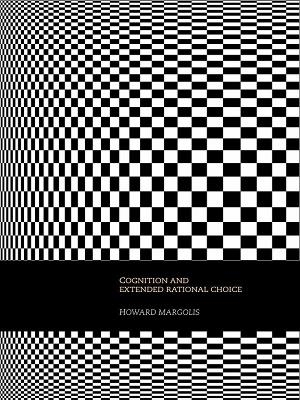
Cognition and Extended Rational Choice
Routledge (Verlag)
978-0-415-70198-3 (ISBN)
Starting from Darwin's own comments on the origins of moral concerns and from a review of notorious cognitive illusions, Margolis shows how rational choice theory can be extended to incorporate social as well as self-interested motivation, but allowing for the cognitive complications that can be expected in domains well-outside familiar experience. This yields a coherent account of many otherwise mystifying results from cooperation experiments.
This book will be of great interest not only to students and researchers in behavioral and experimental economics but across the social sciences.
Howard Margolis is a Professor in the Irving B. Harris Graduate School of Public Policy Studies and the College. He has taught at the University of California-Irvine, and has held research positions at the Institute for Advanced Study, the Russell Sage Foundation, and the Massachusetts Institute of Technology. Margolis' major research interest is in social theory, particularly the underpinnings of individual choice and judgment, which shape aggregate social outcomes. The principal results of this work have been five books: Selfishness, Altruism and Rationality (Cambridge University Press, 1982, University of Chicago Press, 1984); Patterns, Thinking and Cognition (University of Chicago Press, 1987), Paradigms and Barriers (University of Chicago Press, 1993), Dealing with Risk: Why the Public and the Experts Disagree on Environmental Issues (University of Chicago Press, 1996) and It Started with Copernicus: How Turning the World Inside Out Led to the Scientific Revolution (McGraw-Hill 2002).
Introduction. 1. The NSNX Model. 2. Dual-utilities. 3. Norms. 4. The Schelling Diagram. 5. Using the Schelling Diagram. 6. Adverse Defaults. 7. The NSNX Cascade. 8. Public Goods Experiments. 9. Reciprocity Puzzles. 10. Social Illusions. 11. What We See in the World that Looks Like What We See in this Theory: The Case of Terrorism. Appendix: The Data Template.
| Erscheint lt. Verlag | 25.10.2007 |
|---|---|
| Zusatzinfo | 11 Tables, black and white; 29 Line drawings, black and white; 29 Illustrations, black and white |
| Verlagsort | London |
| Sprache | englisch |
| Maße | 156 x 234 mm |
| Gewicht | 385 g |
| Themenwelt | Geisteswissenschaften ► Psychologie ► Allgemeine Psychologie |
| Wirtschaft ► Volkswirtschaftslehre ► Mikroökonomie | |
| Schlagworte | Wahrnehmungspsychologie |
| ISBN-10 | 0-415-70198-8 / 0415701988 |
| ISBN-13 | 978-0-415-70198-3 / 9780415701983 |
| Zustand | Neuware |
| Haben Sie eine Frage zum Produkt? |
aus dem Bereich


